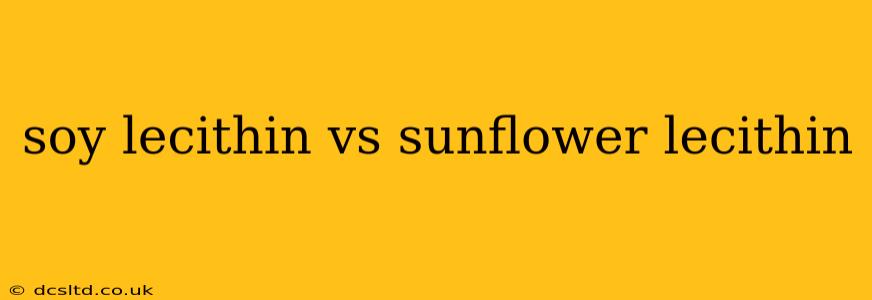Lecithin is a naturally occurring emulsifier found in many foods, including soybeans and sunflowers. Both soy and sunflower lecithin are popular choices as food additives and in various health and beauty products, but they differ in their sourcing, nutritional profiles, and potential allergens. This comprehensive guide will explore the key differences between soy and sunflower lecithin to help you make informed decisions.
What is Lecithin?
Before delving into the specifics of soy versus sunflower lecithin, let's establish a common understanding of lecithin itself. Lecithin is a complex mixture of fatty acids, glycerophospholipids, and other substances. Its primary function is as an emulsifier, meaning it helps bind together substances that don't typically mix, such as oil and water. This makes it incredibly useful in food processing, cosmetics, and pharmaceuticals.
Soy Lecithin: The Traditional Choice
Soy lecithin has been the dominant form of lecithin on the market for many years. It's extracted from soybeans during the oil extraction process. While widely used and relatively inexpensive, its main drawback is the potential for soy allergies. Many people experience allergic reactions to soy, ranging from mild to severe. This makes soy lecithin unsuitable for those with soy allergies or sensitivities.
Advantages of Soy Lecithin:
- Cost-effective: Generally less expensive than sunflower lecithin.
- Widely available: Easily found in most supermarkets and health food stores.
- Established use: A long history of use in food and other industries.
Disadvantages of Soy Lecithin:
- Soy allergies: A major concern for individuals with soy allergies.
- GMO concerns: A significant portion of soy crops are genetically modified, raising concerns for some consumers.
- Potential for pesticide residues: Soybeans, like other crops, can be exposed to pesticides.
Sunflower Lecithin: A Non-GMO and Allergy-Friendly Alternative
Sunflower lecithin is extracted from sunflower seeds. It's gaining popularity as a non-GMO and allergy-friendly alternative to soy lecithin. Because it's derived from sunflower seeds, it is generally free of soy, gluten, and dairy. This makes it a safer option for individuals with allergies or sensitivities to these common allergens.
Advantages of Sunflower Lecithin:
- Hypoallergenic: Generally considered safe for individuals with soy, gluten, and dairy allergies.
- Non-GMO: Sunflower crops are less likely to be genetically modified than soybeans.
- Similar emulsification properties: Offers similar emulsification properties to soy lecithin.
Disadvantages of Sunflower Lecithin:
- Higher cost: Typically more expensive than soy lecithin.
- Less widely available: May be harder to find in some areas compared to soy lecithin.
Which Lecithin is Right for Me?
The best choice between soy and sunflower lecithin depends largely on individual needs and preferences. If you don't have any allergies or sensitivities, soy lecithin may be a suitable and more affordable option. However, if you have a soy allergy, or prefer a non-GMO and allergy-friendly choice, sunflower lecithin is the better alternative, despite its higher cost.
Is Sunflower Lecithin Better Than Soy Lecithin?
There is no definitive "better" lecithin; the optimal choice depends entirely on individual needs. Sunflower lecithin provides an excellent alternative for individuals with soy allergies or those seeking a non-GMO option. However, soy lecithin remains a viable and cost-effective option for those without such concerns.
What are the Nutritional Differences?
While both soy and sunflower lecithin provide similar emulsification properties, their nutritional profiles differ slightly due to the source material. Both are sources of choline, a nutrient important for brain health and liver function. The precise fatty acid composition can also vary slightly depending on the specific processing and source of the lecithin. However, these differences are generally minor and not a significant factor for most consumers.
Where can I buy Soy and Sunflower Lecithin?
Both soy and sunflower lecithin are widely available in health food stores, online retailers, and some supermarkets. Look for them in the health food aisle or online.
This comparison provides a solid overview of the key distinctions between soy and sunflower lecithin. By understanding these differences, you can make an informed decision about which type of lecithin is best suited for your needs.
